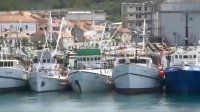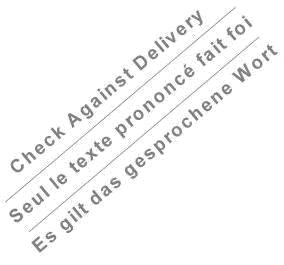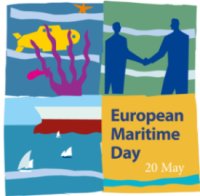Save the Mediterranean and its biodiversity

Event "Save the Mediterranean and its biodiversity"
European Parliament, 20 March 2012
Commissioner Maria Damanaki took part in the event "Save the Mediterranean and its biodiversity", patronized by the European Parliament Members Rita Borsellino and Guido Milana. The initiative is organised to present and discuss examples of good practices supporting research, technology innovation and enhancing traditions and biodiversity in the Mediterranean.

Dear Ms Borsellino, Mr Milana, honourable Members,
I am grateful for the opportunity to meet with you today. I have just been to Italy last week, where I had a fruitful exchange with the Camere and with the industry about the fisheries Reform and the new Fund.
But I understand there are many representatives from Sicily here, and I know that Sicily has its own issues and its own distinct traditions: I am a fan of Montalbano and a keen reader of all of Camilleri's books!
I know that fish features prominently in Sicilian cuisine, which is very rich and diverse. And so are the fishing practices around the island and in all South Italian areas. The reform is also about acknowledging and respecting this diversity.
But, we have to move in one same direction and with one common purpose; and that direction is sustainability.
In Mediterranean, too, fish stocks are depleted. The average overfishing is 80% of the stocks. If we go for sustainability in all its forms, as the reform calls for, this will work for us, for the Mediterranean fisheries, as well as for the Adriatic, the North Sea and so on.
For environmental sustainability, we need to bring our stocks to Maximum Sustainable Yield by 2015 and phase out discards.
As for selectivity, I believe it is as important in the Mediterranean as in the rest of Europe. What I propose is a gradual ban on discards. The Council approved this idea yesterday during its last meeting.
For example, we in the Mediterranean have developed a taste for juvenile fish - as a Greek, I hope I can say this without offending you. Our consumers are driving a market that makes it attractive for fishermen to land and sell baby fish for human consumption. We really have to change this.
When I met with Italian consumers' organisations and NGOs last week, I asked them to do a public relations campaign and raise awareness among chefs, who should stop serving juvenile fish in restaurants; and among consumers, who should refuse to buy them.
Here I would like to clear up one misconception about our proposed discard ban. I have heard many times that we risk having truckloads of juvenile fish being transported to fishmeal factories. This is not my intention. It is clear that we cannot eliminate discards just by introducing an obligation to land everything. What we have to do is to fish more selectively as the first step and we have funding available already now under the current fund to switch to more selective gears, and more support is foreseen in the new Fund. So this is what it is about: avoid catching juveniles in the first place. It would then only be the minimum amount of juveniles that would go to fishmeal reduction.
Environmental protection will bring about economic and social sustainability: only by restoring our fish stocks, we will be able to offer adequate catches and an adequate income for fishermen.
I have concrete proof of this, because in the past two years we have started to reap the benefits of the sustainable management of the previous years. In the Northern fishing grounds of the EU, we have now increased quotas, and the fishermen will have an extra 135 million euro in their pockets.
I want the same for the Mediterranean.
We also have figures from the New Economics Foundation stating that, if we reach sustainable levels, we can have 25 to 30 percent more income and 80 000 more jobs in the sector by 2022.
Ladies and gentlemen,
There is another necessary reform going on right now, and that concerns the functioning of General Fisheries Commission for the Mediterranean - to make it fit for modern conservation and management standards. We are very keen on this revision process, because clearly, if we want to improve fisheries management in the Mediterranean, we must ensure that the playing field is level towards third countries and that everybody plays by the same set of rules.
But I know you are interested in discussing the new fund - and you are quite right, because it is the fund that will make change possible and the reform real.
I want to stress first of all that we have really designed the fund for the fishermen and to help them in the transition to sustainable patterns.
Already now I am helping fishermen to adopt more selective methods - through the current fisheries fund. With the future one, even more so: every single fisherman who is willing to change his gear to a more selective one will be funded from us. And if some gears are not yet on the market, and fishermen want to test and develop new ones, then we will pay for that as well. The new European Fund will support any measure that reduces unwanted catches.
So, we will finance investments, onboard and in ports, to store and land those catches. We will also fund associations of fishermen, to give them a stronger role vis-à-vis wholesalers.
Moreover, our fund will pay for fishermen to get professional advice on business and marketing strategies and special support for innovative ideas.
We will incentivise start-ups and retrofitting of vessels, including safety measures like safety vests equipped with GPS or tele-medicine.
Operators will receive compensation for collecting biological or socio-economic data. We will finance vocational training, professional qualification and re-qualification. Spouses of fishermen will also have access to training and networking activities.
Of course, we also believe in diversification into other maritime fields. That, too, will relieve the pressure on the stocks; moreover, it is through innovation and smart growth in coastal areas that we will deliver on the Europe 2020 strategy.
Italian cinema has understood this. In the film "Terraferma", also set off the coast of Sicily, your comedian Fiorello plays the son of an old fisherman.
"Why are we wasting time, Dad?" – Fiorello asks his father.
"There's no fish in the sea anymore. Let's transform the boat. Let's take tourists around the island."
A very clever idea. Italy has practically invented 'pescaturismo' and 'ittiturismo' – two concepts that we are now trying to extend to other parts of Europe, because they carry economic potential.
We are now working on a maritime strategy for the Adriatic and the Ionian regions and it will concern fisheries, but also other maritime activities like tourism. Fiorello is right: this is an important maritime sector that drives growth and creates revenue along your beautiful coasts.
In sum, there are plenty of measures designed for the fishing sector itself. We haven’t neglected small-scale coastal fishermen either. These make up 80 percent of the Mediterranean fleet and 65 percent of the Italian one, so this aspect is important: for all the measures I have just mentioned, small-scale fishermen will be granted up to seventy-five percent the cost of the project - a very high co-funding share.
To conclude, onorevoli eurodeputati,
If we want to save the Mediterranean, we have to start with the reform. I urge you to support it at this crucial state of negotiation. And I urge Italy to continue looking forward and embrace new sustainable practices.
Because it is clear that without Italy – and without Sicily - there can be no sustainable fishing in the Mediterranean.
Thank you.


 European Maritime Day 2013
European Maritime Day 2013 Reform of the Common Fisheries Policy
Reform of the Common Fisheries Policy 12 hours for Greece
12 hours for Greece